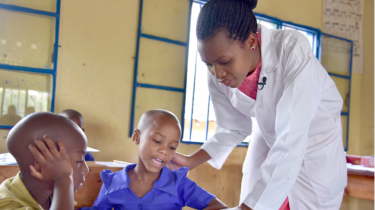Ensuring that higher education is inclusive and free from discrimination is not just a matter of widening access and increasing the number of women. It is also about transforming pedagogy to remove unconscious bias – and women’s leadership plays a critical part in this. Our case study, for the Strategic Partnerships for Higher Education Innovation and Reform (SPHEIR) programme, focused on one partnership in Kenya and identified eight ways in which female leadership can be transformational.
Launched in 2016, SPHEIR aims to improve the quality, relevance, scale, accessibility and affordability of higher education and the performance, governance and influence of higher education systems and institutions in focus countries. It is part of the inclusive growth and development agenda of the Foreign and Commonwealth Development Office (FCDO).
Implemented by a consortium led by the British Council, SPHEIR funds eight partnerships across countries in sub-Saharan African, Myanmar, Jordan and Lebanon. The total value of grant and match funding is £37.1 million. The partnerships include more than 60 organisations: universities, educational NGOs, professional bodies, private sector and research units. The final goal is that reforms contribute to economic and social development. Results for gender equality and social inclusion matter, therefore, as with all UK aid endeavours.
SPHEIR is expected to contribute to Sustainable Development Goal 5 (Gender Equality) which includes increasing women’s access to higher education. It is also expected to tackle social inclusion by widening access and addressing the concerns of those who are excluded and marginalised by, for example poverty, race or disability. These issues are important as higher education institutions can exacerbate social and economic inequalities unless they purposefully set out to understand and address them. As part of our ongoing collaborative work with the British Council to evaluate SPHEIR, Triple Line carried out this study to better understand where partnerships are performing well on gender, and where there is scope for improvement.
Gender equality and social inclusion are not necessarily terms that are widely understood in context. Our team is experienced in making these issues more tangible and real. Ensuring that higher education is accessible, fair, safe and free from discrimination is not just a matter of widening student access and increasing the number of women teaching classes. It is also about seeing subject content with a gendered lens, transforming pedagogy to remove unconscious bias, and uncovering and reforming the processes and systems, the relationships and ways of seeing (or not seeing) that institutionalise inequality and discrimination at every level.
For this study, we designed a conceptual framework to assess exactly where and how programmes such as SPHEIR might take action at every stage of the project cycle, looking at the way gender and inclusion are integrated into how problems are analysed, objectives are set, strategies are developed and results measured. We also looked at gender and inclusion in grant-making processes, partnerships, pedagogical approaches, institutional arrangements such as human resource management, in committee membership, and lecturer and student levels.
Sharing good examples of progress on gender and inclusion helps partnerships learn about approaches that work: We identified specific attributes of female leadership that contributed to the success of far reaching pedagogical reform
The study identified tangible examples of the progress made by SPHEIR and where opportunities remain. Of particular note was the success of partnerships working to reform pedagogy in social science subjects and the efforts made to help lecturers and students analyse the social and economic impact of poverty, gender inequality, disability and exclusion. This progress was pioneered by three partners in particular: The Partnership for Pedagogical Leadership in Africa (PedaL), Transforming Employability for Social Change in East Africa (TESCEA) and Assuring Quality Higher Education in Sierra Leone (AQHEd-SL). We were particularly interested in understanding the skills needed to work in contexts where there are pronounced inequalities in academic decision-making. So we focused on one partnership, PedaL and through interviews with Dr Linda Waldman, from the Institute of Development Studies at the University of Sussex, and the team leader, Dr Beatrice Muganda, of Partnership for African Social and Governance Research (PASCR) in Nairobi, Kenya, we identified eight attributes of female leadership that are transformational.
1. Leaders pursue a vision selflessly and inspire the same in team members
2. Eliciting team buy-in
3. Carrying people along in an evolving process
4. Prompting subtlety of thought
5. Problem-solving through inclusive discussion
6. A nurturing approach to build leadership skills
7. Availability – after the training stops, in a continuing dialogue
8. Diffuse leadership that negotiates and influences
SPHEIR has clearly made progress but there is a mountain to climb yet. Dr Beatrice and her colleagues are now tackling gender bias in STEM (science, technology, engineering and mathematics) subjects while SPHEIR as a whole will continue to press for better representation of women teachers and students in faculties of finance and business, gender equality in staff pay and progression, and policies to ensure that those who employ graduates pay them equally.
Photo Credit : Title photo from SPHEIR website




